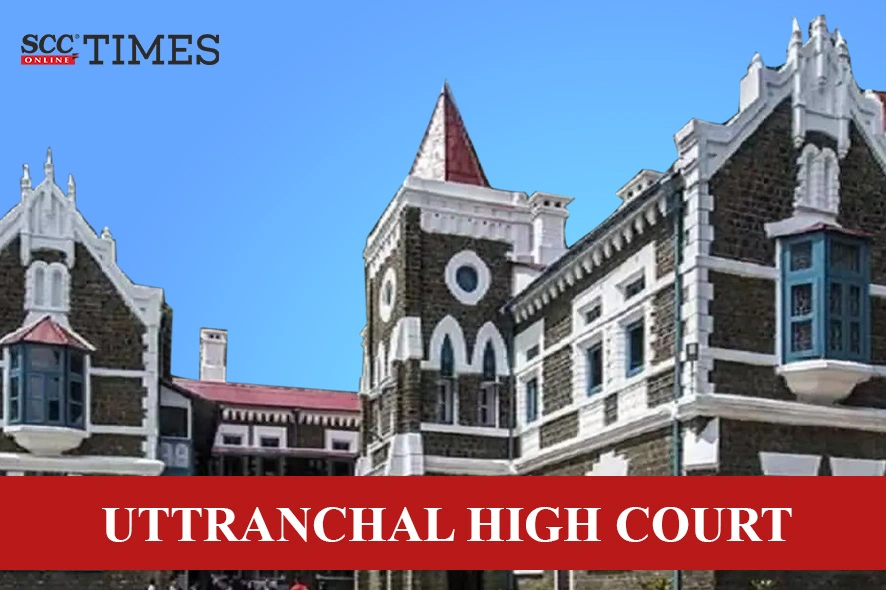Uttaranchal High Court: In the present case, a Criminal Reference and a Criminal Appeal had arisen from a common judgment and order dated 22-09-2021 and 24-09-2021, passed by the Special Judge (POCSO), Pithoragarh (‘the Trial Court’) by which respondent was convicted for the offences punishable under Sections 323 and 376-AB of the Penal Code, 1860 (‘IPC’), and Section 5 read with Section 6 of the Protection of Children from Sexual Offences Act, 2012 (‘POCSO Act’). The Division Bench of Ritu Bahri, CJ., and Alok Kumar Verma*, J., allowed the appeal partly by confirming conviction of respondent-the accused and holding that the present case, was not a fit case where extreme death sentence should be imposed and the ends of justice would be met if the sentence of death was commuted to rigorous imprisonment for a term of twenty years.
Background
A Sub-Inspector along with other police personnel were told by a secret informer that a 5-year-old girl had been raped by her stepbrother. Thereafter, the police reached the spot, where they were informed by a lady that she saw that a girl-the victim was hiding inside a big plastic pipe on her terrace. She also told the police that the victim told her that she was living nearby with her brother-accused, who beats her with stick, makes her lie on the ground, takes off her pajamas, and does dirty things with her, causing pain.
Thereafter, the police arrested the accused and FIR was registered against him under Sections 323 and 376 of IPC and Section 5 read with Section 6 of POCSO Act. The Sub-Inspector produced the victim for her medical examination before N.S. Gunjyal, a Radiologist, and Harshikesh Joshi, a Dentist, who examined her X-ray and her teeth, respectively, to determine her age. Both the doctors concluded that the victim’s age was between 5-6 years. Thereafter, the Trial Court framed charges against the accused under Sections 323 and 376-AB of IPC and Section 5 read with Section 6 of POCSO Act.
Analysis, Law, and Decision
The Court relied on Ganesan v. State, (2020) 10 SCC 573, wherein the Supreme Court while dealing with conviction under the POCSO Act, held that the statement of the prosecutrix, if found to be worthy of credence and reliable, requires no corroboration and the court may convict the accused on the sole testimony of the prosecutrix. Thus, this Court, after evaluating all the evidence, opined that the victim’s testimony was trustworthy and agreed with the Trial Court’s decision on the point of conviction.
The Court also relied on Santosh Kumar Satishbhushan Bariyar v. State of Maharashtra, (2009) 6 SCC 498, where the Supreme Court held that the capital punishment should be awarded only in the rarest of rare cases and there must be clear evidence to indicate that the convict was incapable of reform and rehabilitation. Further, the Court relied on Sandesh v. State of Maharashtra, (2013) 2 SCC 479, where the Supreme Court held that it was for the prosecution to lead evidence to show that there was no possibility that the convict could not be reformed.
The Court opined that reformation and rehabilitation of a convict was a mitigating circumstance for the purposes of awarding punishment, and the prosecution did not place any material or evidence to conclude that reformation, rehabilitation, and social re-integration of the accused into society was not possible. The Court stated that it was true that the accused committed the most heinous crime but considered the following mitigating circumstances to state that lesser penalty should be awarded to the accused:
-
The accused was aged 31-32 years at the time of the offence; was a labourer; and did not have any criminal antecedents.
-
The accused had a daughter and a son, who were still young, and their mother had died. Therefore, there was no one else except the accused for their care and maintenance.
-
It could not be said that the accused would be a menace to the society in future if the death sentence was not awarded to him.
-
It could not be said that reformation, rehabilitation, and social re-integration of the accused into society was not possible.
Thus, the Court allowed the appeal partly by confirming conviction of the accused and holding that the present case, was not a fit case where extreme death sentence should be imposed and the ends of justice would be met if the sentence of death was commuted to rigorous imprisonment for a term of twenty years. The Court stated that the sentence of twenty years would include the period of sentence already undergone and the sentence awarded for the conviction under Section 323 of IPC would run concurrently.
[State of Uttarakhand v. Janak Bahadur, 2024 SCC OnLine Utt 1242, decided on 21-05-2024]
*Judgment authored by: Justice Alok Kumar Verma
Advocates who appeared in this case:
For the Appellant: J.S. Virk, Deputy Advocate General assisted by Rakesh Kumar Joshi, Brief Holder.
For the Respondent: Manisha Bhandari, Advocate.








